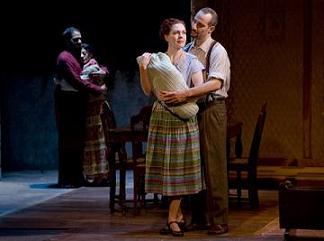See This: Next Theatre's Return to Haifa
By Alexander Hough in Arts & Entertainment on Feb 16, 2010 9:30PM

Photo of Anish Jethmalani, Diana Simonzadeh, Saren Nofs-Snyder and Daniel Cantor from Next Theatre's website
The couples' similarities are more important than their differences, particularly their overriding dream for a home where they can safely lead simple, everyday lives. The first act, set in 1947 and 1948 at the end of Ishmail and Safiyeh's time in Haifa and the beginning of Jakob and Sarah's, frames these shared desires by bouncing back and forth in time between the two couples. The method of storytelling isn't revolutionary, but it's elegantly done. The simple set designed by Tom Burich - it's just the house bracketed by cinder block walls graffitied with Hebrew and Arabic - remains the same, even if the scene takes place elsewhere. Always looming, the house becomes the de facto main character.
But Return to Haifa is much more than an illustration of the parallels between warring people. Yes, it's humanizing that the couples have the same wants, but it's tragic that they want literally the exact same thing. The first act's sense of foreboding blossoms into conflict during the emotional 1967 confrontation that viscerally and painfully explores concepts of home and ownership. The addition of the abandoned/adopted son Moishe (Miguel Cohen) takes the conflict to the extreme: Ishmail and Safiyeh can't have their Haifa home, but it's just a thing. Moishe is their flesh and blood, yet he considers them his enemy.
This is also where Return to Haifa comes closest to encountering trouble. Part of the problem is the introduction of a central character who's not one of the four principals. Jethmalani, Simonzadeh, Cantor, and Nofs-Snyder are so good, both individually and in their respective relationships, that Cohen seems to have trouble keeping up. More crucially, the relationship between Moishe and his two sets of parents isn't established with the same time, care, or skill the other relationships are. Return to Haifa is more concerned with the reactions of his parents, a situation that's given even more weight and depth by what Sarah reveals about her own lost child, but adding Moishe to the fray is loaded with implications and questions. We should've been concentrating on the brilliant performances of the parents, but our sympathy and interest peeled off to Moishe. In a scenario where the child should be the focus, he's in danger of distracting.
However, this hiccup doesn't detract much from the show, which is excellent across the board, down to the lighting (Jared Moore) and directing (Jason Southerland) - sepia tones, intimating both the past and the tan shades of the Middle East, turn bright to sharpen focus or dim to a dour, steely gray to amplify tragic, violent, and traumatic events that are strikingly conveyed through smart choreographic use of the small cast. Return to Haifa is about the Israeli-Palestinian conflict, but it's also not, which is why it's so effective. The look in Ishmail and Safiyeh's eyes alone in the barren refugee camp in Ramallah speaks volumes about the injustice of being displaced, but it says even more about the loss of home. Return to Haifa is personal rather than political and provokes without offending. In a play set in Israel in 1948 and 1967, that alone would be an achievement; that it's more than that gives you a good reason to head up to Evanston to check it out.
Return to Haifa, through March 7, Next Theatre Company at the Noyes Cultural Arts Center, 927 Noyes Street, Evanston, (847) 475-1875, $25-$40